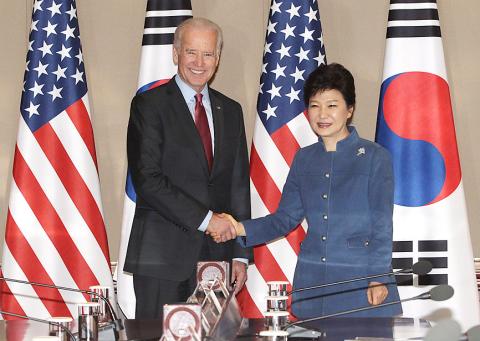China’s new air defense zone will not affect US military operations in the region even as it increases the risk of “miscalculations,” US Vice President Joe Biden said.
Biden spoke in Seoul yesterday after a visit to Beijing where he pressed Chinese leaders to take practical steps to avoid conflict over the air zone, which covers a large swath of the East China Sea, including islands also claimed by Japan and Taiwan and a submerged rock that South Korea considers its own.
He met South Korean President Park Geun-hye for talks earlier in the day at the presidential office in Seoul, where Park called the US-South Korea relationship “the linchpin to stability and security not just on the Korean Peninsula, but in northeast Asia.”

Photo: EPA
Biden and Park held hands as they walked together after greeting each other.
“I was absolutely clear on behalf of my president: We do not recognize this zone,” Biden said in a speech at Yonsei University. “It will have no effect on American operations. Just ask my general. None. Zero.”
Biden’s trip to Asia was originally intended to focus on the 12-nation Trans-Pacific Partnership trade pact and reinforcing a renewed US emphasis on the region. That agenda was overtaken by China’s Nov. 23 announcement of the air defense identification zone, which has ratcheted up tensions in the region as the US, South Korea and Japan all ran military flights through the area in a test of Chinese resolve.
The perils of in-air confrontations are illustrated by a 2001 incident when a Chinese fighter jet collided with a US Navy plane monitoring Chinese communications over the South China Sea. The Chinese pilot was killed, while the US plane made an emergency landing on China’s Hainan Island.
China held its crew of 24 for 11 days before freeing them after the US expressed regret for the death of the Chinese pilot.
“US military forces will continue to professionally conduct operations in international airspace and waters throughout the Indo-Asia-Pacific in steadfast support of our allies, partners and regional security,” Admiral Samuel Locklear, III, commander, US Pacific Command, said in an e-mailed statement.
China’s declaration of the air zone has complicated its efforts to forge closer ties with Park’s government and gives her an incentive to further strengthen relations with the US.
Biden used his opening remarks to Park to reiterate the US commitment to its military rebalancing to Asia.
“The United States never says anything it does not do,” Biden said.
It is “never been a good bet to bet against America,” he said, “and America will continue to place its bet on South Korea.”

SECURITY: As China is ‘reshaping’ Hong Kong’s population, Taiwan must raise the eligibility threshold for applications from Hong Kongers, Chiu Chui-cheng said When Hong Kong and Macau citizens apply for residency in Taiwan, it would be under a new category that includes a “national security observation period,” Mainland Affairs Council (MAC) Minister Chiu Chui-cheng (邱垂正) said yesterday. President William Lai (賴清德) on March 13 announced 17 strategies to counter China’s aggression toward Taiwan, including incorporating national security considerations into the review process for residency applications from Hong Kong and Macau citizens. The situation in Hong Kong is constantly changing, Chiu said to media yesterday on the sidelines of the Taipei Technology Run hosted by the Taipei Neihu Technology Park Development Association. With

CARROT AND STICK: While unrelenting in its military threats, China attracted nearly 40,000 Taiwanese to over 400 business events last year Nearly 40,000 Taiwanese last year joined industry events in China, such as conferences and trade fairs, supported by the Chinese government, a study showed yesterday, as Beijing ramps up a charm offensive toward Taipei alongside military pressure. China has long taken a carrot-and-stick approach to Taiwan, threatening it with the prospect of military action while reaching out to those it believes are amenable to Beijing’s point of view. Taiwanese security officials are wary of what they see as Beijing’s influence campaigns to sway public opinion after Taipei and Beijing gradually resumed travel links halted by the COVID-19 pandemic, but the scale of

A US Marine Corps regiment equipped with Naval Strike Missiles (NSM) is set to participate in the upcoming Balikatan 25 exercise in the Luzon Strait, marking the system’s first-ever deployment in the Philippines. US and Philippine officials have separately confirmed that the Navy Marine Expeditionary Ship Interdiction System (NMESIS) — the mobile launch platform for the Naval Strike Missile — would take part in the joint exercise. The missiles are being deployed to “a strategic first island chain chokepoint” in the waters between Taiwan proper and the Philippines, US-based Naval News reported. “The Luzon Strait and Bashi Channel represent a critical access

Pope Francis is be laid to rest on Saturday after lying in state for three days in St Peter’s Basilica, where the faithful are expected to flock to pay their respects to history’s first Latin American pontiff. The cardinals met yesterday in the Vatican’s synod hall to chart the next steps before a conclave begins to choose Francis’ successor, as condolences poured in from around the world. According to current norms, the conclave must begin between May 5 and 10. The cardinals set the funeral for Saturday at 10am in St Peter’s Square, to be celebrated by the dean of the College